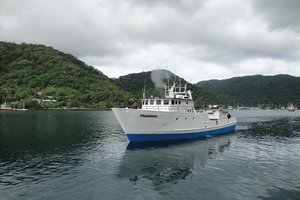
A fishing vessel in the waters of American Samoa.
American Samoa has filed a lawsuit in the US Federal District Court of Honolulu over the amendment to the Large Vessel Prohibited Area or LVPA.
The amendment allows local longliners to fish within 12 miles from shore, whereas previously these vessels could only fish 50 miles out.
In its 21 page suit, the territory says the U.S. Government violated its sovereign rights by shrinking the zone around the territory that protects it and its fishing culture from large vessels.
In 2002, the National Marine Fisheries Service, a branch of the National Oceanic and Atmospheric Administration within the Department of Commerce, established an area of approximately three to 50 nautical miles around American Samoa where boats larger than 50 feet were prohibited from fishing.
But last month, the service issued a new final rule that shrank the protection zone from 50 nautical miles to 12.
According to the suit, the rule “is based on the mistaken belief that the conditions that led to the establishment of the 2002 rule no longer exist.”
The complaint says the governor of American Samoa responded with data showing 30 active vessels in the area.
The governor also explained that even if there is only one small vessel fishing with long-lines in the protected area, there are approximately 29 others that bottom-fish or troll within the fishery – having converted from long-line fishing.
Only 10 small vessels counted in the service’s 2002 rule are now inactive, according to data from the American Samoa Department of Marine and Wildlife Resources.
The complaint states: “Given this evidence the concerns upon which the 2002 rule was put in place still exist and there is still a potential for gear conflict with shallow lines that connect to long-line buoys.”
In a submission to NMFS during the comment period for the LVPA amendment, Governor Lolo Moliga also explained the importance of these waters to the people and reminded the service of the Deeds of Cession and the responsibilities of the U.S. government to protect the culture of American Samoa.
He said, “Shrinking the area impedes local fisherman the ability to navigate freely in the waters and thus their ability to effectively fish, the territory says.
The NMFS says it held three public meetings during the required comment period prior to establishing the new rule and that holding additional meetings would yield no new information.
Officials also point out that the new rule requires an annual review of the effects on the local fishery – a point the territory rejects.
The territory’s complaint says there were several comments from the public requesting that the service consider the Samoan culture and the Deeds of Cession when finalizing the rule.
One comment came from Dr. Ruth Matagi, Director of Marine and Wildlife Resources, and others came from descendants of the chiefs who originally signed the Deeds of Cession in 1900.
But according to the suit, despite the comments, “the fisheries service made no analysis of the rights and guarantees provided in the Deeds of Cession and how the new rule is consistent with them, instead their response simply asserts its jurisdiction under Magnuson-Stevens Act and that views of the stakeholders were ‘taken into account.”
American Samoa asks the federal court in Hawaii to vacate and set aside the final rule and declare that it is inconsistent with Deeds of Cession.
Named as defendants in the suit are the National Marine Fisheries Service, U.S. Department of Commerce and NOAA, Commerce Secretary Penny Pritzker; Western Regional Pacific Fishery Management Council executive director Kitty Simonds; National Marine Fisheries Service assistant administrator Eileen Sobeck; and Michael Tosatto, regional administrator of the NOAA Fisheries Service Pacific Islands Regional Office.
American Samoa is represented by Steven S.K. Chung and Michael Iosua of Imanaka Asato in Honolulu. Iosua previously worked in the American Samoa Attorney General’s Office.
Asked today about the lawsuit Attorney General Talauega Eleasalo Ale said the governor intends to issue a statement.



